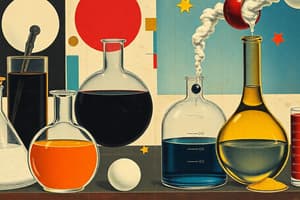Podcast
Questions and Answers
What is the fourth state of matter?
What is the fourth state of matter?
Plasma
At what temperatures does a Bose-Einstein condensate (BEC) occur?
At what temperatures does a Bose-Einstein condensate (BEC) occur?
Near absolute zero (-273.15°C or -459.67°F)
Name one property of gases mentioned in the text.
Name one property of gases mentioned in the text.
Expanding to fill containers
Give an example of a gas mentioned in the text.
Give an example of a gas mentioned in the text.
What are the unique properties of solids compared to liquids and gases?
What are the unique properties of solids compared to liquids and gases?
What is the distinguishing feature of plasma compared to gases?
What is the distinguishing feature of plasma compared to gases?
Describe the particle interaction in liquids and why they flow.
Describe the particle interaction in liquids and why they flow.
How do gases differ in terms of particle distance compared to solids and liquids?
How do gases differ in terms of particle distance compared to solids and liquids?
Explain why solids have a defined shape while liquids and gases do not.
Explain why solids have a defined shape while liquids and gases do not.
What property of gases allows them to take up the entire volume of their container?
What property of gases allows them to take up the entire volume of their container?
Study Notes
Matter is anything that has mass and takes up space. It can exist in a variety of forms, known as the different states of matter. These states include solids, liquids, gases, plasmas, and Bose-Einstein condensates. Each state exhibits unique properties due to how their constituent particles interact with one another.
Solid State
In a solid, the particles are close together and vibrate around a fixed position within the crystal structure. This causes the molecules to have strong forces holding them together. As a result, solids have a defined shape and do not flow until they reach high temperatures. Examples of solids include ice, wood, and metal.
Liquid State
Liquids are between solids and gases in terms of particle interaction. They have less distance between particles than solids, but more than gases. Liquids flow because their particles move freely past each other. Some properties of liquids include filling any container completely, flowing when poured, taking the shape of the container, and having a relatively constant volume. Examples of liquids include water, oil, and mercury.
Gaseous State
Gases have the most distance between particles compared to the other states of matter. Particles in gases move around rapidly and have very little resistance to being compressed. Due to this low density, gases take up the entire volume of their container and exert pressure. Properties of gases include compressibility, expanding to fill containers, and maintaining almost constant temperature and pressure under certain conditions. Examples of gases include air, hydrogen, and helium.
Plasma State
Plasma is the fourth state of matter and consists of charged particles, such as electrons and ions. It is similar to a gas but has electrically charged particles instead of neutral ones. In nature, plasma is found in lightning bolts, stars, and neon lights.
Bose-Einstein Condensate
A Bose-Einstein condensate (BEC) is the fifth state of matter and occurs only at extremely cold temperatures - near absolute zero (-273.15°C or -459.67°F). At these temperatures, all atoms in a BEC behave like a single quantum entity.
Understanding the different states of matter allows us to appreciate how versatile and adaptable matter can be in various situations.
Studying That Suits You
Use AI to generate personalized quizzes and flashcards to suit your learning preferences.
Description
Learn about the different states of matter - solids, liquids, gases, plasmas, and Bose-Einstein condensates. Understand the unique properties and behaviors of each state based on the interaction of their constituent particles.




